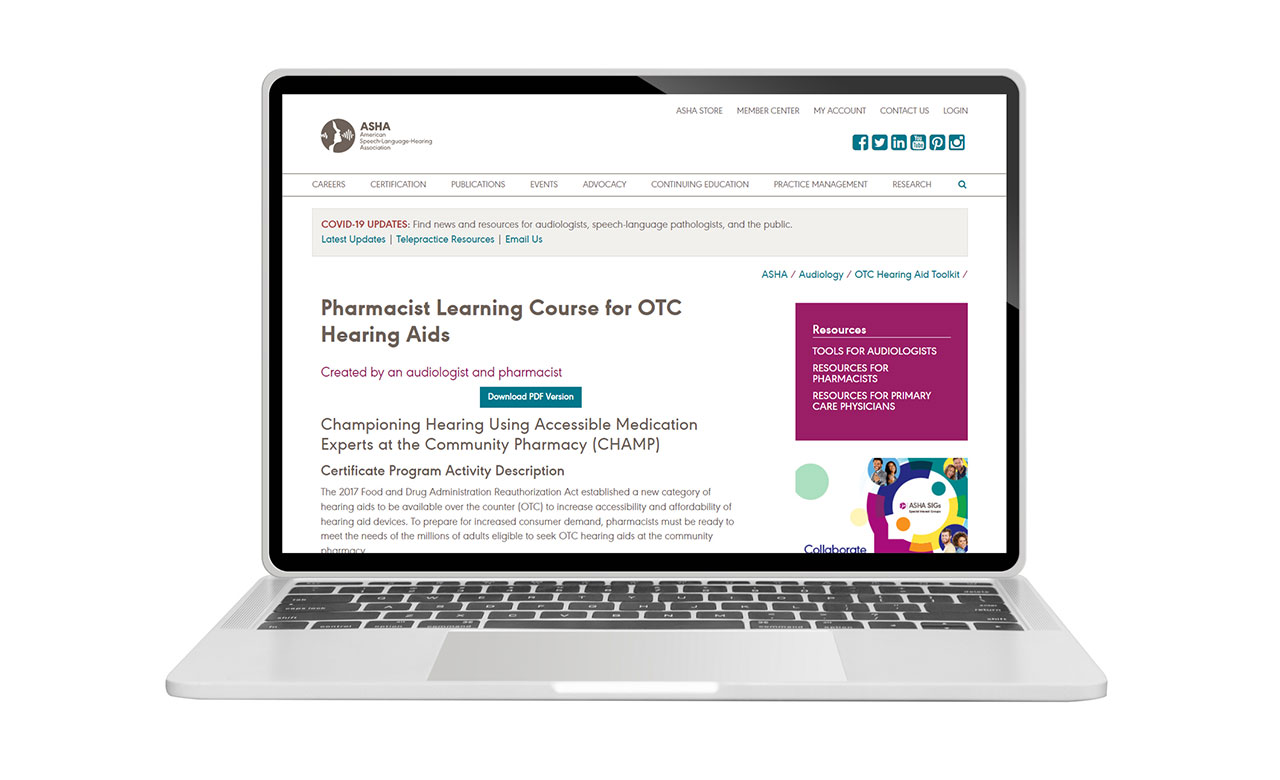Sonya Collins
After FDA approval of OTC hearing aids last summer, pharmacies may already be stocking these items. A recent paper published in JAPhA described the arrival of OTC hearing aids as an opportunity for collaboration between pharmacists and audiologists.
“We want to educate pharmacists so that they can help get those patients who are not going to benefit from an OTC hearing aid to an audiologist,” said Elaine Mormer, PhD, CCC-A, an audiologist and director of audiology clinical education in the Department of Communication Science and Disorders at University of Pittsburgh School of Health and Rehabilitation Sciences. Mormer coauthored the JAPhA paper.

OTC hearing aids: A role for pharmacists
OTC hearing aids are approved for adults ages 18 and older who perceive their hearing loss to be mild to moderate. These are self-care devices that do not require intervention or assistance from any health care professional.
When pharmacists have the opportunity to interact with a patient seeking an OTC hearing aid, they can help ensure that the device is the right fit for their patient. Besides age and perceived hearing loss, there may be other factors that could mean a patient would not benefit from an OTC device and should see an audiologist to determine the underlying cause of the problem and identify appropriate next steps.
“Pharmacists can ask the patient questions to ensure that using an OTC hearing aid won’t deter them from seeking further care when the hearing loss is caused by a treatable medical condition that should be solved first,” said Lucas Berenbrok, PharmD, an associate professor in the School of Pharmacy at University of Pittsburgh, and lead author of the JAPhA paper.
The American Speech-Language-Hearing Association (ASHA) has created a checklist of questions for pharmacists to ask patients who are interested in OTC hearing aids. Pharmacists can visit www.asha.org/siteassets/audiology/patient-hearing-checklist.pdf to access the complete tool.
The checklist includes the following risk factors that might suggest a patient needs follow-up care with an audiologist before trying an OTC device:
- Hearing that is much better in one ear than the other
- Recent, sudden hearing loss
- Ringing, roaring, or beeping in one or both ears
- A history of head and neck chemotherapy or radiation, or medications that may include hearing loss as an adverse effect
- Recent, active drainage from one or both ears
- Constant pain or discomfort in one or both ears
- Dizziness
Pharmacists may educate themselves on the features of OTC hearing aids and help patients choose the most suitable one that meets their needs and is a match for their level of technical literacy.
“We can help patients compare devices. For example, how does it control volume—is it a button on the device or is a smartphone app required? Does the device use rechargeable batteries? Will Bluetooth connection be necessary?” said Berenbrok.
He also stressed the importance of follow up. Aside from a toll-free number on the box, pharmacists may be the only professional available to answer patient questions about these new hearing aids. When the patient returns to the pharmacy, the pharmacist should ask how they are doing with the device and gauge the need for an audiologist referral.
Potential for collaboration
Berenbrok and Mormer recommend that pharmacists be prepared to refer patients to an audiologist as needed. ASHA has created a tool to help pharmacists find a hearing professional in their area (see QR code).
Many people will benefit from OTC hearing aids and not everyone who seeks out the device needs a referral to an audiologist but, Mormer said, pharmacists should communicate to patients that “You don’t know how much hearing loss you have until you’ve had a hearing test.” ■

Resources
Pharmacists can learn more about counseling patients on OTC hearing aids and collaborating with audiologists through resources available at apha.us/ASHAHearingAidToolkit.
Berenbrok and Mormer have also designed an online course for pharmacists. More information can be found at apha.us/ASHALearningCourse. ■